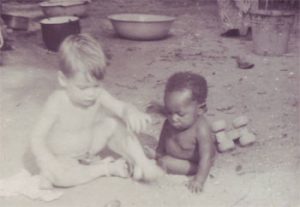My husband was working for a multinational company in Leopoldville (Kinshasa). I’d never been anywhere before that where there was no law and order and such dire food shortages. There wasn’t even enough proper food to feed my baby. But then we got caught up in a war, which was terrifying. We both wanted to get away from Leopoldville so my husband took a job on plantation in the interior. It was, literally, in Conrad’s Heart of darkness, and we had to travel in a small boat 150 miles down the vast Congo River to get there. It was an amazing journey past tiny fishing villages and virgin jungle. I was determined to love this place, and in many ways I did because it was so peaceful and beautiful. But there was endemic malaria and if any of us got seriously ill we were a thousand miles from Leopoldville, so there was always a lurking danger. When we started hearing rumours of war, both my husband put our heads in the sands. The village people were friendly and we didn’t believe anything could possibly happen to us. But the war did break out and all the white people were taken hostage in Stanleyville. That evening four men came to our house and said: ‘Mauvaises nouvelles. Tu doit partir tout de suite’ – you must leave now’ ‘I can’t’ I said ‘I’ve been to the doctor and he says I’m about to give birth any moment.’

I didn’t write about it for years and years because my feelings were so conflicted. I had to find the right voice. I was writing about very serious injustice not only in the past, but in the present. The democratically elected Prime Minister Patrice Lumumba had just been assassinated by agents in the west. And there was still inherent racism in the multinational corporations. But, of course we were only tiny cogs in a huge wheel; the fact that my husband thought his job was significant and took it so seriously, while I was ridiculously idealistic and romantic, struck me as inherently comic. And the minute you send yourself up a bit, it helps no end. After that it was easy because it was a memoir. We were at a crucial turning point in history and I was right in the middle of it.